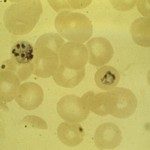Lien vers Pubmed [PMID] – 1668275
Development 1991 Nov; 113(3): 1017-29
The B isoform of creatine kinase (BCK), which is expressed at a high level in embryonic neural tissues, is also expressed abundantly in developing striated muscle and is an early marker for skeletal myogenesis. Using isoform-specific 35S-labeled antisense cRNA probes for in situ hybridization, we have detected BCK mRNAs in embryonic mouse and chick myotomes, the first skeletal muscle masses to form in developing embryos. These transcripts are detectable as soon as myotomes are morphologically distinguishable. BCK is expressed at high levels in both skeletal and cardiac muscle in mouse and chick embryos. In the mouse, BCK transcript levels fall of rapidly in striated muscle shortly after the onset of MCK gene expression. The M isoform of creatine kinase (MCK), the striated muscle-specific isoform, is expressed later than BCK. In the mouse, BCK transcripts are expressed in myotomes at 8.5 days post coitum (p.c.), but MCK transcripts are not detected before 13 days p.c. In the chick, BCK mRNAs are present at Hamburger-Hamilton stage 13, but MCK mRNAs are not detected before stage 19. We have compared the patterns of expression of the CK genes with those of myogenic differentiation factor genes, which are thought to regulate skeletal muscle-specific gene expression. In the chick, both CMD1, first detected at stage 13, and myogenin, first detected at stage 15, are present prior to MCK, which begins to be expressed at stage 19. Unlike the mouse embryo, CMD1, the chick homologue of MyoD1, is expressed before chick myogenin. In the mouse, myogenin, first detected at 8.5 days p.c., is expressed at the same time as BCK in myotomes. Both myogenin and MyoD1, which begins to be detected two days later than myogenin, are expressed at least two days before MCK. It has been proposed that the myogenic factors, MyoD1 and myogenin, directly regulate MCK gene expression in the mouse by binding to its enhancer. However, our results show that MCK transcripts are not detected until well after MyoD1 and myogenin mRNAs are expressed, suggesting that these factors by themselves are not sufficient to initiate MCK gene expression.

